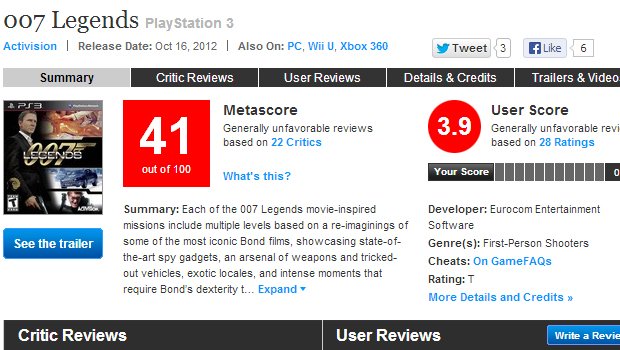Michael Bay proves you should be happy about Metacritics influence
Aggregate scores may have too much power, but it’s better than having no influence
Metacritic again and again gets attacked by both developers and press, and for admittedly good reasons. Such as... It’s unfairly used by publishers to judge how developers should be compensated. Some fans put too much stock in it, throwing tantrums when some wacky reviewer dares to give a game they're pretty sure will be their favorite game ever a score that’s below the average. And don’t even get us started on the rampant score-bombing that takes place in the user-rating section. But even if Metacritic is a remarkably attractive lightning rod, it also proves how much better gamers have it compared to pretty much every other form of entertainment.

Like it or not, higher review scores often lead to higher sales for games, probably because many gamers pay attention to what critics are saying. Executives using an average from Metacritic at least approaches rewarding creators for quality work that correlates to sales. And that measure of success is far better than the film industry’s. In that world critical consensus matters less and less, as sharp advertising is able to turn out a fan base no matter how many terrible reviews a film garners.
For example, many film critics gave Transformers: Revenge of the Fallen particularly terrible reviews--the late Roger Ebert called it “a horrible experience of unbearable length.” Its Metacritic average, which comprises 32 individual opinions, is 35 out of 100, a veritable death sentence in the gaming world. Some Transformers fans responded angrily online with complaints that amounted to, “It’ll make a billion dollars anyway, so your bad review doesn’t even matter!!!”
And just as history will look back on Revenge of the Fallen as one of the most noisily pointless pieces of trash mankind ever produced, that angry sentiment was proven right. The movie made over $400 million in the US, and $836 million worldwide, making it the second highest grossing film of 2009. Additionally, its sequel, Transformers: Dark of the Moon, was ravaged by critics to a degree that rivaled its title's ravaging of the English language, averaging a 42. And yet, it earned $1.1 billion, the fifth highest worldwide gross of all time. These films are seemingly critic-proof (you can bet Michael Bay didn’t get punished by executives for his metascore), and the Autobots are hardly alone in this troubling trend.

When we looked at the top 10 highest grossing films of 2010, 2011, and 2012, Alice in Wonderland (Metascore 53), Breaking Dawn Part 1 (45), Hangover Part II (44), and Pirates of the Caribbean: On Strange Tides (45) all placed for their respective years. Despite such low aggregate scores, the US public paid a combined $1.1 billion to see those movies. Alternatively, Oscar winning/nominated films like Zero Dark Thirty (95), Amour (94), The Artist (89), The Social Network (95), and Winter's Bone (90), did a cumulative $250 million in the same timespan.
What happens when games got scores comparable games to the billion dollar crowd? 2012 release Epic Mickey 2 got under a 60, while 007 Legends and the most recent Harry Potter game ended up in the low 40s. You can bet they weren’t top 10 sellers, and the developers of all three games were closed by January of this year.

Those studios didn’t deserve to be shut down for bad scores. I’d much rather see them get another chance to create the greatest games they possibly can. However, wouldn’t it be a nice change to hear that Michael Bay was out of a job because critics agreed he makes films that insult the intelligence of children? Or that Tim Burton and Johnny Depp got penalized a couple million dollars for once again recycling the same routine for the last two decades?
Weekly digests, tales from the communities you love, and more
Henry Gilbert is a former GamesRadar+ Editor, having spent seven years at the site helping to navigate our readers through the PS3 and Xbox 360 generation. Henry is now following another passion of his besides video games, working as the producer and podcast cohost of the popular Talking Simpsons and What a Cartoon podcasts.



